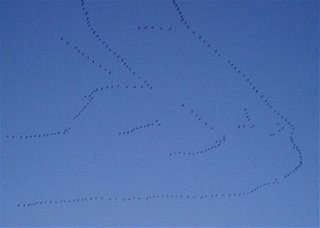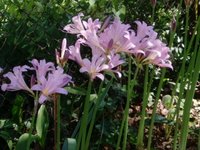 When fall migrations begin, I'm struck by how little faith I have. Wild creatures, like the geese in this photo I took last January when we spent a weekend at Pere Marquette Park near the confluence of the Illinois and Mississippi rivers, seem to travel on instinct alone, or else they communicate in a mysterious language that we humans are not privileged to know. For them, concepts such as faith, hope, or direction seem not to matter. They do what they must; go where they are called. Even in disorganized lines of flight like this flock had, they rotate leadership without apparently ever realizing (or asking) why.
When fall migrations begin, I'm struck by how little faith I have. Wild creatures, like the geese in this photo I took last January when we spent a weekend at Pere Marquette Park near the confluence of the Illinois and Mississippi rivers, seem to travel on instinct alone, or else they communicate in a mysterious language that we humans are not privileged to know. For them, concepts such as faith, hope, or direction seem not to matter. They do what they must; go where they are called. Even in disorganized lines of flight like this flock had, they rotate leadership without apparently ever realizing (or asking) why.
But I have to ask "Why," all the time. Part of it is a natural curiosity that started in childhood and survived the put-downs of adolescence, a curiosity that drew me into journalism and also led me to explore the shelves of the bookmobile, looking for books on birds and stars and gardening and later needlework, photography and quilting. If I had been a boy I would have been allowed to dismantle windup alarm clocks and small gasoline engines just for entertainment. As it was, my Dad helped me learn to change tires and gap sparkplugs anyway.
But there's another kind of "why" that keeps me from having the kind of spiritual certainty that many friends enjoy. I don't know why we as human beings seem bound to disagree, to fall into warring camps, to distrust each other, hurt each other. Calling it a sinful, fallen world has never made sense to me--this week for Sunday School class we are studying the Creation stories in Genesis and it seems clear enough there that God considered the creation good. I'm told the next chapter will explain it all to me, but framing all the ills of the world in terms of a sinful human desire for knowledge and experience, when this curiosity seems to be inborn, is something I've always found hard to accept. Some take it on faith, but I keep asking, why?
For a long time now, I've been inclined to tell myself that my skepticism, curiosity and even doubt are not evil or fallen in themselves, but innate traits, perhaps gifts, although such are not named as spiritual gifts in Paul's writings, for sure. I imagine that well-meaning folks reading this might take it upon themselves to point out that my doubt is a form of rebellion against my Maker. I guess I disagree with that, still. Like the apostle Thomas, I feel entitled to get my news from the Source; I want to see and touch and know. Scripture makes it clear that faith is a spiritual gift, but for me, it's still a leap--a much bigger leap than the one a teenage squirrel took today as it ran up and down the garage roof more than 20 times before launching itself upward toward a flimsy maple branch a good 12 feet above. He (or she) pawed frantically, scrambled to hold on, and eventually scampered to the main trunk of the tree. Me, I'm still pacing up and down, thinking about the questions, still wondering Why.
 This past week has featured inescapable reminders of the solemn 5th anniversary of what has become known as “9/11”. For this generation and this time, it is The Day that Life Changed Forever. Indeed, a once impenetrable nation now appears vulnerable to any vicious malefactor in the world, live and in color on television. Over and over. On that day five years ago, I heard a radio report as I was dressing for work that at first sounded like a rerun of the prior attack on the World Trade Center. Then I heard an announcer say: We’ve just seen a second plane crash into the South Tower. I ran downstairs to turn on my television, just in time to hear another announcer at the Pentagon say: Something really big has made an impact here; the whole building just shuddered.
This past week has featured inescapable reminders of the solemn 5th anniversary of what has become known as “9/11”. For this generation and this time, it is The Day that Life Changed Forever. Indeed, a once impenetrable nation now appears vulnerable to any vicious malefactor in the world, live and in color on television. Over and over. On that day five years ago, I heard a radio report as I was dressing for work that at first sounded like a rerun of the prior attack on the World Trade Center. Then I heard an announcer say: We’ve just seen a second plane crash into the South Tower. I ran downstairs to turn on my television, just in time to hear another announcer at the Pentagon say: Something really big has made an impact here; the whole building just shuddered.
That day and the days that followed were pure hell for the people most directly affected—those who lost loved ones and those who tried futilely to rescue the perishing. And the wounds are still raw for them. For some of us in the Midwest, the images became merely surreal, once we had satisfied ourselves that no one we knew had died. For me the most ominous reminder of the danger we were in was silence—we live just a stone’s throw from the airport and are accustomed to the roar of planes landing and taking off all day and late into the night. While civil aviation was grounded, the neighborhood was eerily quiet. One night I thought I heard a plane taking off around midnight and I wanted to jump out of bed and cheer.
Although I understand the necessity, I still resent having to take off my shoes for airport security screeners. I think if they ever want to search me again (as happened in October 2001 at New Orleans when a matron groped me in front of a dozen of my students as we prepared to return home from a convention) I’ll just pull my shirt off over my head and get it over with. (I should try to remember to wear something modest underneath, maybe a sports bra, like that Olympic soccer player a few years back.) In 2001 it was no tweezers, cuticle scissors or my ever-trusty Girl Scout knife in my purse. Now it’s no moisturizer, nasal spray or even hand sanitizer. How am I supposed to avoid getting the flu while tucked shoulder to shoulder with total strangers for three hours or more? Yes, I know I’m whining. I understand this is for the greater good. I stay within the lines. I go where I’m told. Everyone is a potential terrorist, even you and me. Especially that funny-looking bald guy in short shorts who just tried to get on the plane with a cup of Starbucks coffee.
It’s easy to forget there have been other Days that Changed Life Forever. Pearl Harbor happened two years before I was born, but it left an indelible memory for my parents. President Kennedy was shot when I was a junior in college. I remember the day as a loss of national innocence—an American president could be killed, in cold blood, while the world watched. Then it was Martin Luther King Jr.’s turn, and Bobby Kennedy’s. Forget about the threat of Communism; our society was unraveling into inner chaos all by itself. During the Cold War, activists illustrated the imminence of nuclear war by setting up a doomsday clock. The hands kept moving closer to midnight, symbolic of the unleashing of a terror from which the world might not recover. Sometime after the Berlin Wall came down in 1989—another day that changed lives across the globe—the clock ticked backwards by a minute or two and the world could breathe again, or so it seemed.
The 9/11 attacks, dreadful as they were, could not move me as much as the April 19, 1995 bombing of the federal building in Oklahoma City. That assault on people who were simply working to help fellow citizens seared something in my soul forever. I’m a native Oklahoman, and I had to dash home from work and sit glued to my TV set for days. This attack was personal. Someday I’ll manage to walk through that memorial, but I can’t do it yet. Remembering that helps me understand the ambivalence New Yorkers have about what should be done with their "sacred ground." I was puzzled when Timothy McVeigh was quickly caught because his car had an expired license plate. How could he plan such an elaborate crime and then do something stupid like drive a clunker that would grab a state trooper’s attention? A psychologist explained it to me: even the worst perpetrators of the most heinous events want to be stopped, and they will make subconscious mistakes.
Sometimes I wonder what would have happened if we had gone after the 9/11 perpetrators with psychological sophistication instead of with cannons roaring. Don’t misunderstand; I don’t advocate being soft on terrorists but I think it would have been more productive to catch them and try them, than to pursue the path we are on now. Even worse, I think 9/11 did change our lives forever in one especially negative way: we no longer welcome the alien among us, much less provide hospitality to the stranger, as the Hebrew and Christian scriptures exhort us to do. Even in our neighborhoods, we trust almost no one. Any stranger, any strange behavior, arouses suspicion and fear. We are obsessed with illegal aliens and national security. Once Lady Liberty welcomed immigrants, but today we debate how best to seal off our borders. We want to preserve our way of life by denying it to anyone who is not a citizen, even visitors who have come here lawfully. Bridges are out; fences are in. The Lady's torch is sputtering. Yes, the world has changed, and not for the better.
 When fall migrations begin, I'm struck by how little faith I have. Wild creatures, like the geese in this photo I took last January when we spent a weekend at Pere Marquette Park near the confluence of the Illinois and Mississippi rivers, seem to travel on instinct alone, or else they communicate in a mysterious language that we humans are not privileged to know. For them, concepts such as faith, hope, or direction seem not to matter. They do what they must; go where they are called. Even in disorganized lines of flight like this flock had, they rotate leadership without apparently ever realizing (or asking) why.
When fall migrations begin, I'm struck by how little faith I have. Wild creatures, like the geese in this photo I took last January when we spent a weekend at Pere Marquette Park near the confluence of the Illinois and Mississippi rivers, seem to travel on instinct alone, or else they communicate in a mysterious language that we humans are not privileged to know. For them, concepts such as faith, hope, or direction seem not to matter. They do what they must; go where they are called. Even in disorganized lines of flight like this flock had, they rotate leadership without apparently ever realizing (or asking) why.
